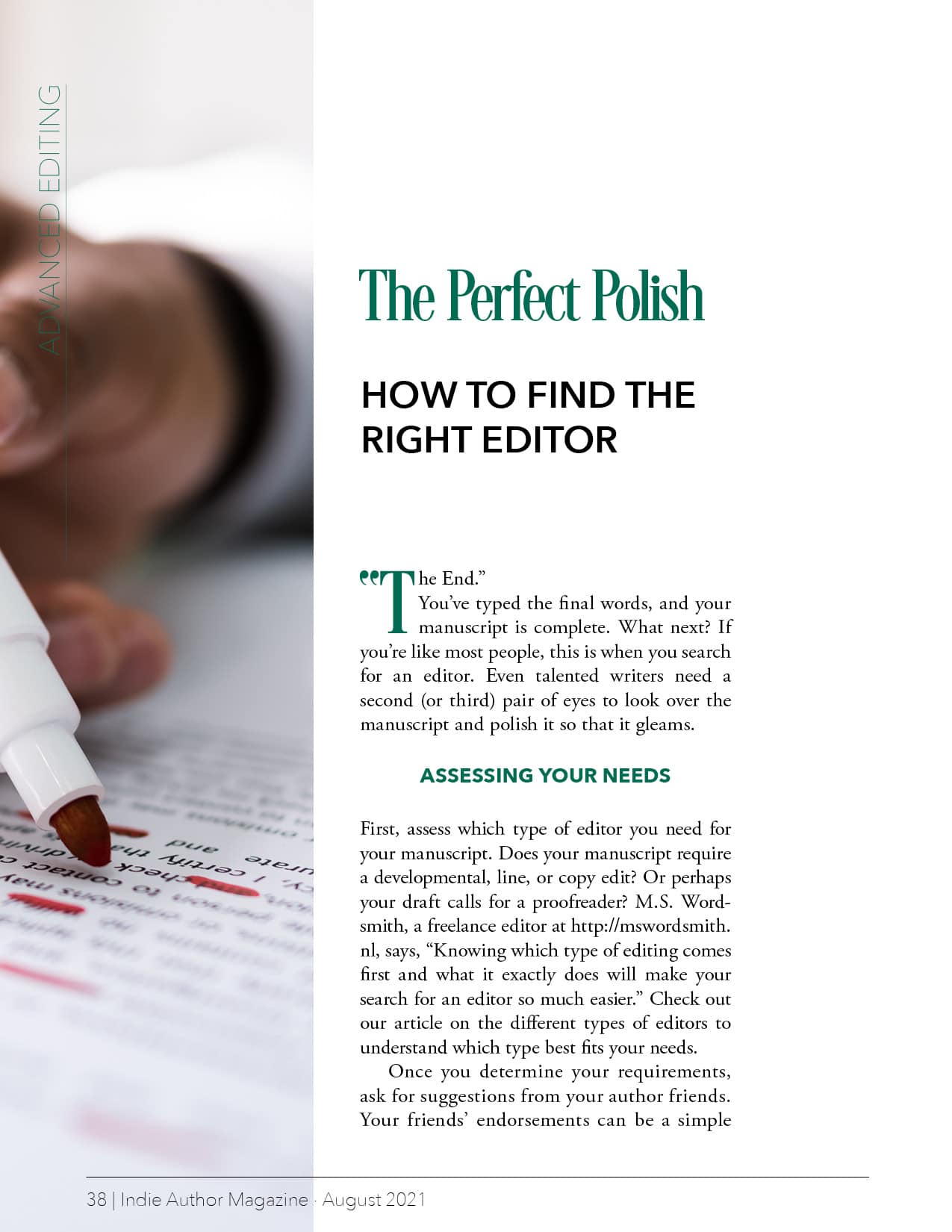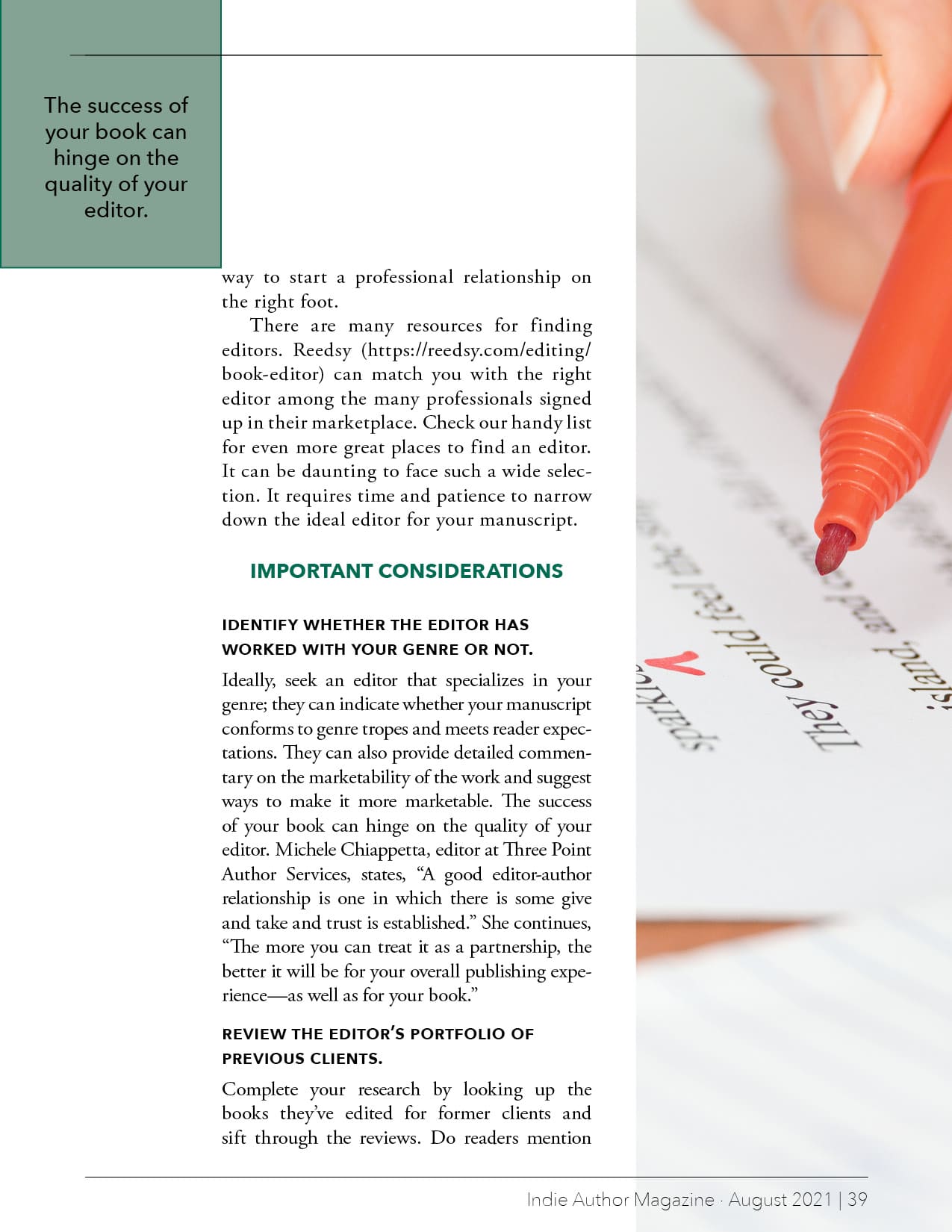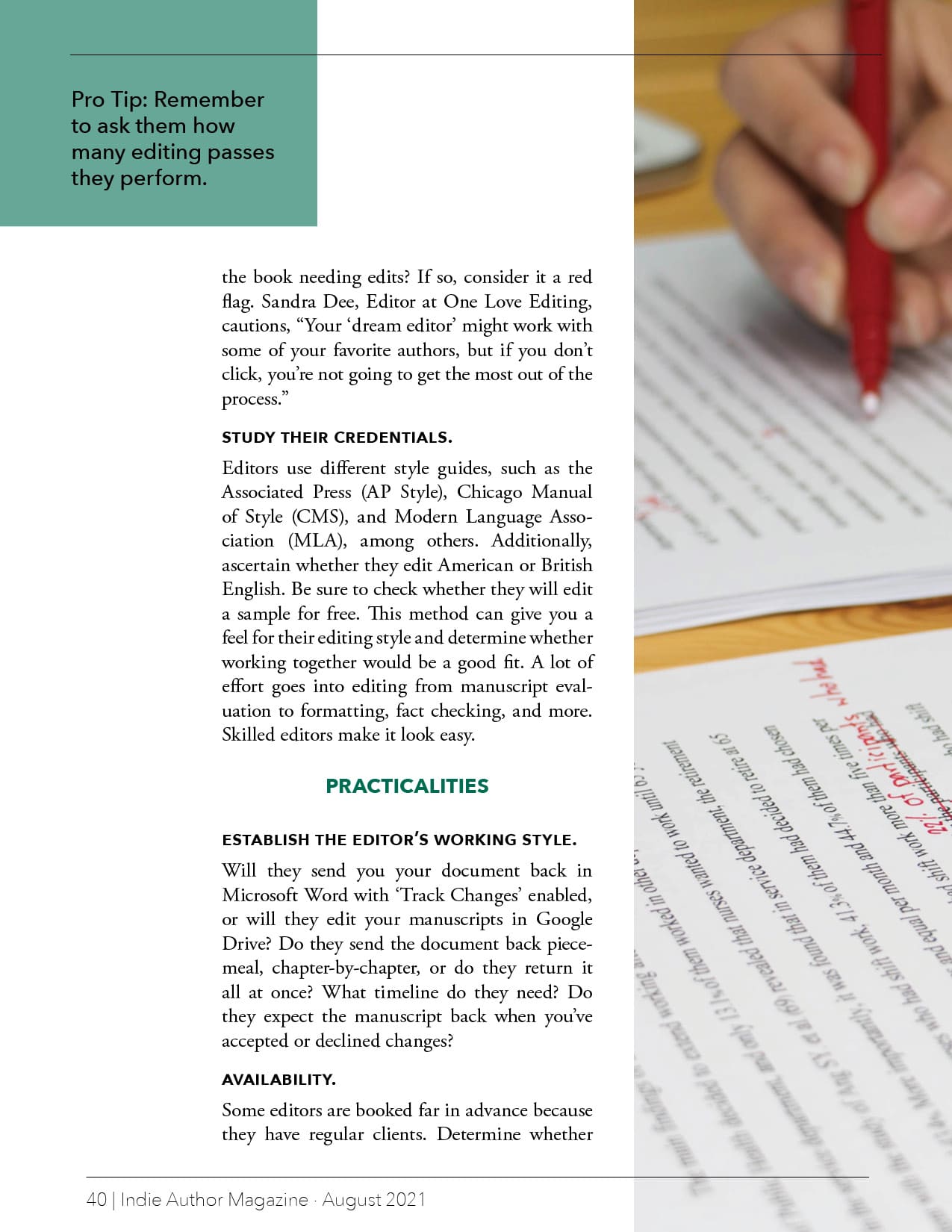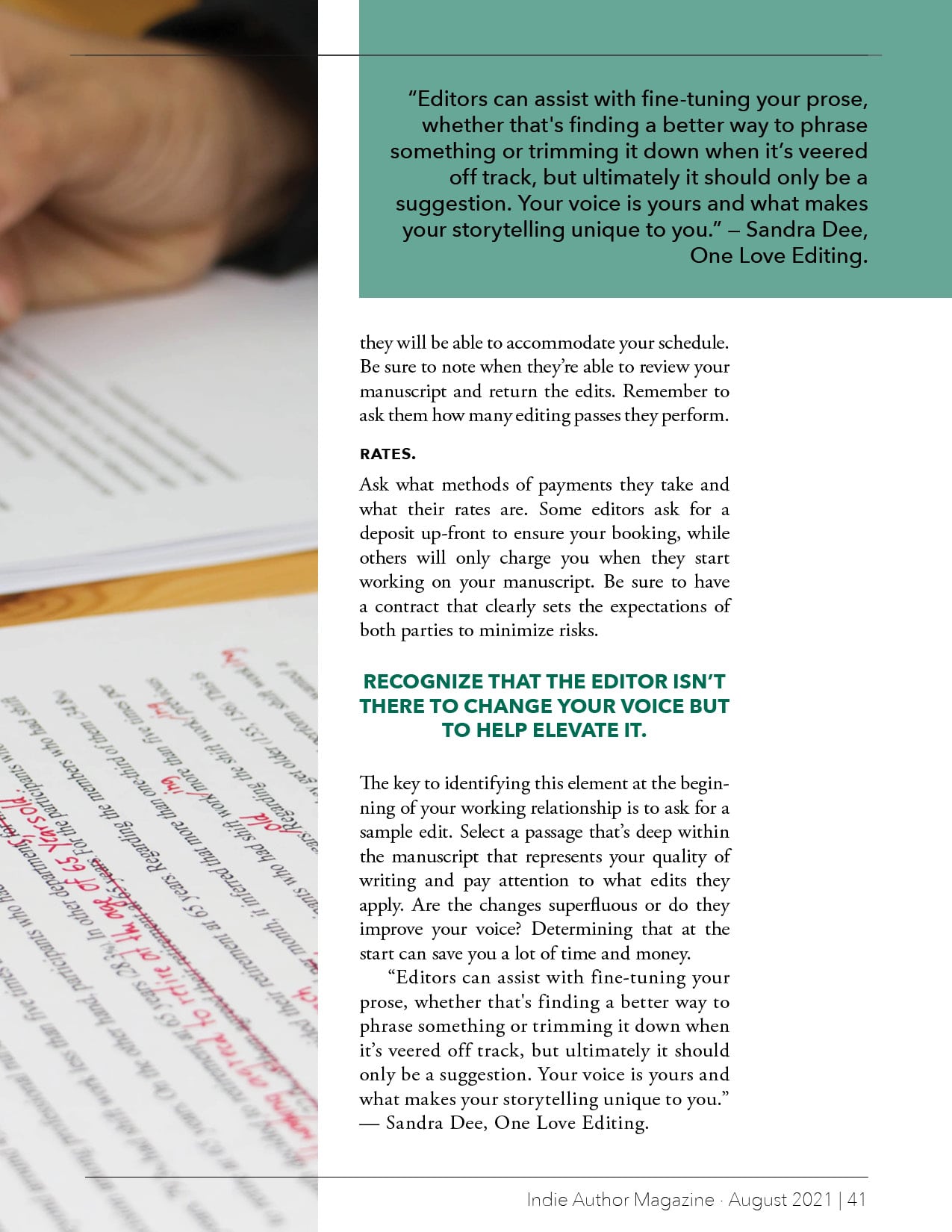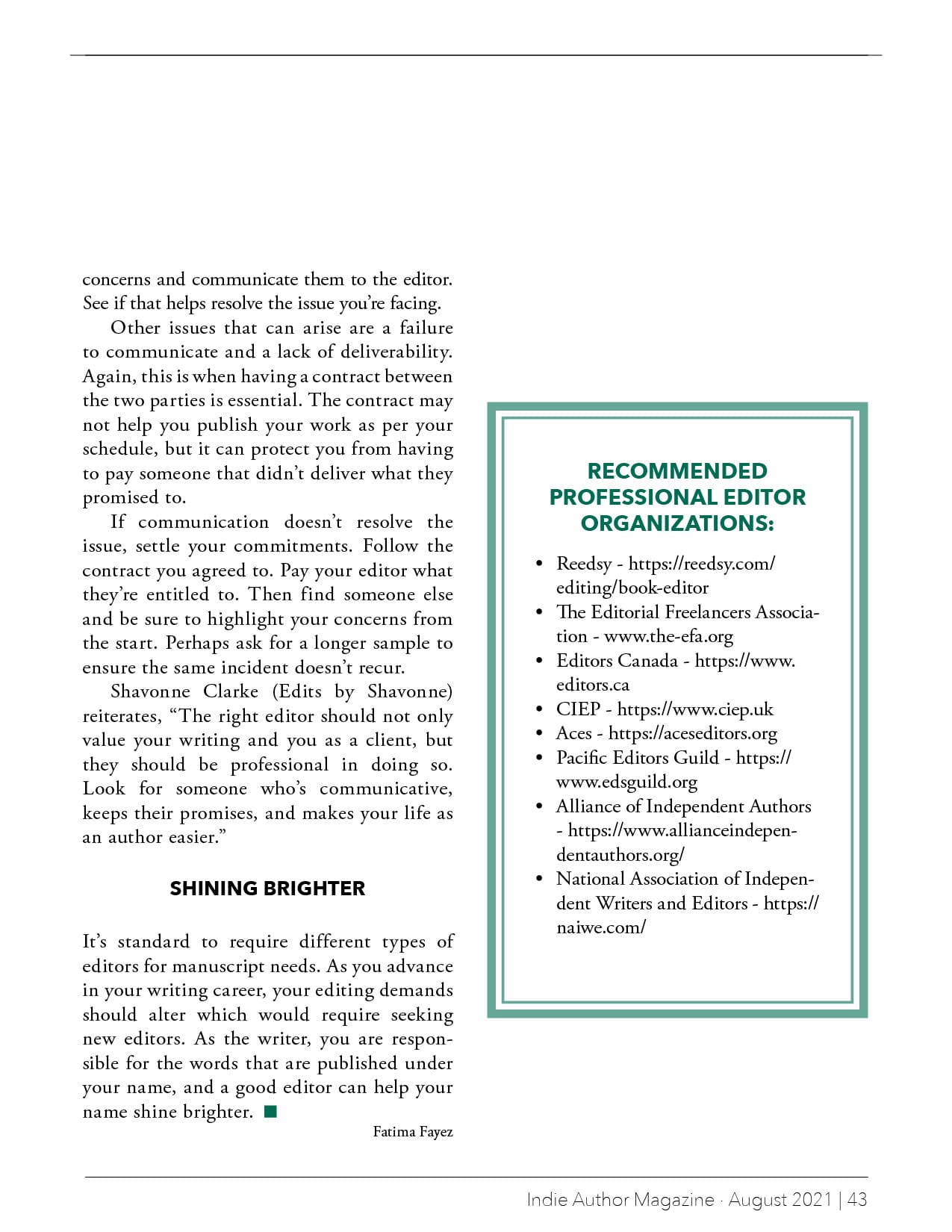“The End.”
You’ve typed the final words, and your manuscript is complete. What next? If you’re like most people, this is when you search for an editor. Even talented writers need a second (or third) pair of eyes to look over the manuscript and polish it so that it gleams.
Assessing Your Needs
First, assess which type of editor you need for your manuscript. Does your manuscript require a developmental, line, or copy edit? Or perhaps your draft calls for a proofreader? M.S. Wordsmith, a freelance editor at http://mswordsmith.nl, says, “Knowing which type of editing comes first and what it exactly does will make your search for an editor so much easier.” Check out our article on the different types of editors to understand which type best fits your needs.
Once you determine your requirements, ask for suggestions from your author friends. Your friends’ endorsements can be a simple way to start a professional relationship on the right foot.
There are many resources for finding editors. Reedsy (https://reedsy.com/editing/book-editor) can match you with the right editor among the many professionals signed up in their marketplace. Check our handy list for even more great places to find an editor. It can be daunting to face such a wide selection. It requires time and patience to narrow down the ideal editor for your manuscript.
Important Considerations
Identify whether the editor has worked with your genre or not.
Ideally, seek an editor that specializes in your genre; they can indicate whether your manuscript conforms to genre tropes and meets reader expectations. They can also provide detailed commentary on the marketability of the work and suggest ways to make it more marketable. The success of your book can hinge on the quality of your editor. Michele Chiappetta, editor at Three Point Author Services, states, “A good editor-author relationship is one in which there is some give and take and trust is established.” She continues, “The more you can treat it as a partnership, the better it will be for your overall publishing experience—as well as for your book.”
Review the editor’s portfolio of previous clients.
Complete your research by looking up the books they’ve edited for former clients and sift through the reviews. Do readers mention the book needing edits? If so, consider it a red flag. Sandra Dee, Editor at One Love Editing, cautions, “Your ‘dream editor’ might work with some of your favorite authors, but if you don’t click, you’re not going to get the most out of the process.”
Study their credentials.
Editors use different style guides, such as the Associated Press (AP Style), Chicago Manual of Style (CMS), and Modern Language Association (MLA), among others. Additionally, ascertain whether they edit American or British English. Be sure to check whether they will edit a sample for free. This method can give you a feel for their editing style and determine whether working together would be a good fit. A lot of effort goes into editing from manuscript evaluation to formatting, fact checking, and more. Skilled editors make it look easy.
Practicalities
Establish the editor’s working style.
Will they send you your document back in Microsoft Word with ‘Track Changes’ enabled, or will they edit your manuscripts in Google Drive? Do they send the document back piecemeal, chapter-by-chapter, or do they return it all at once? What timeline do they need? Do they expect the manuscript back when you’ve accepted or declined changes?
Availability.
Some editors are booked far in advance because they have regular clients. Determine whether they will be able to accommodate your schedule. Be sure to note when they’re able to review your manuscript and return the edits. Remember to ask them how many editing passes they perform.
Rates.
Ask what methods of payments they take and what their rates are. Some editors ask for a deposit up-front to ensure your booking, while others will only charge you when they start working on your manuscript. Be sure to have a contract that clearly sets the expectations of both parties to minimize risks.
Recognize that the editor isn’t there to change your voice but to help elevate it.
The key to identifying this element at the beginning of your working relationship is to ask for a sample edit. Select a passage that’s deep within the manuscript that represents your quality of writing and pay attention to what edits they apply. Are the changes superfluous or do they improve your voice? Determining that at the start can save you a lot of time and money.
“Editors can assist with fine-tuning your prose, whether that’s finding a better way to phrase something or trimming it down when it’s veered off track, but ultimately it should only be a suggestion. Your voice is yours and what makes your storytelling unique to you.” — Sandra Dee, One Love Editing.
Strong editors ensure logic and clarity of your ideas and guarantee consistency of voice and usage. Editors that respect your voice will ask for or put together a stylesheet for your manuscript. This ensures word usage and references remain relatively consistent throughout the work. Pay attention to whether they adjust your word usage or sentence structure. Editors will often add comments to ask if you would like to rework areas that could use adjusting and offer suggestions. These comments can be helpful and add insight to their thought processes. Focus on whether you’re agreeing or disagreeing with their choices. That could signify whether your working relationship is a good fit or not.
At the end, it is up to you to acknowledge whether the editor helped improve your writing or whether a simple run through editing software would have resulted in the same result.
Knowing When It’s Not Working
Accepting that an editor may not be a good fit for your manuscript can be a bitter pill to swallow. After all, you put in the work to find them, you liked their sample edit, everything seemed great, but you don’t appreciate how they changed the voice of your manuscript. Your story sounds different, and not in the way you had hoped. What do you do now? First, highlight your concerns and communicate them to the editor. See if that helps resolve the issue you’re facing.
Other issues that can arise are a failure to communicate and a lack of deliverability. Again, this is when having a contract between the two parties is essential. The contract may not help you publish your work as per your schedule, but it can protect you from having to pay someone that didn’t deliver what they promised to.
If communication doesn’t resolve the issue, settle your commitments. Follow the contract you agreed to. Pay your editor what they’re entitled to. Then find someone else and be sure to highlight your concerns from the start. Perhaps ask for a longer sample to ensure the same incident doesn’t recur.
Shavonne Clarke (Edits by Shavonne) reiterates, “The right editor should not only value your writing and you as a client, but they should be professional in doing so. Look for someone who’s communicative, keeps their promises, and makes your life as an author easier.”
Shining Brighter
It’s standard to require different types of editors for manuscript needs. As you advance in your writing career, your editing demands should alter which would require seeking new editors. As the writer, you are responsible for the words that are published under your name, and a good editor can help your name shine brighter.
Fatima Fayez
Resource Box:
Recommended Professional Editor Organizations:
- Reedsy – https://reedsy.com/editing/book-editor
- The Editorial Freelancers Association – www.the-efa.org
- Editors Canada – https://www.editors.ca
- CIEP – https://www.ciep.uk
- Aces –
- Pacific Editors Guild – https://www.edsguild.org
- Alliance of Independent Authors – https://www.allianceindependentauthors.org/
- National Association of Independent Writers and Editors – https://naiwe.com/

